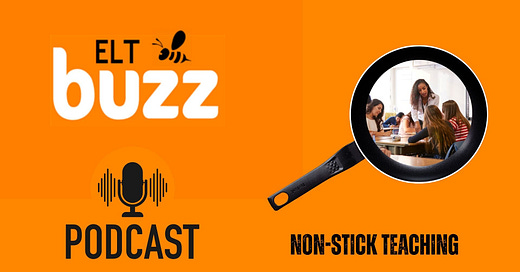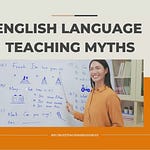ELT Pros On Linkedin | Video Library | Our Blog | ELT Buzz News | TpTs
[This piece/post first appeared as part of a book of essays for teachers titled, “The Unbearable Lightness Of Teaching.” ELT Buzz Library members can get the whole book free - plus, all the 100s of professional development materials there are free for registered members.]
………………………………………………………………………..
There are so many professing to know what a “bad” teacher is. It seems you can’t go oline without someone rallying against teachers who don’t do this or do that (wrong). I’d rather focus on the positive.
How about a list of ’25 ways of being a good teacher’?
IMHO, teaching is a great art with many pretenders and charlatans. There are many who teach but few who really accomplish “learning”. Learning here defined as not just “knowing” but also “questioning” and coming to new realizations. Praxis. Teachers promoting the act of thinking and communicating, not just the banking of ideas. Here, I also tell a lot of what “teaching is…” I also love Doug Lemov's approach in Teach Like A Champion, focusing on the salient fact that anyone can be a good teacher and it's the small things that add up and make the whole "great teacher".
So how to be a “non-stick” teacher? A teacher that cooks up a storm but leaves no mess?
Here, is my list. Get the PDF copy»>
1. Get to know your students! Make it personal, connect the curriculum to their lives.
2. Engage the “ego”. Promote pride. Give ALL students success. Meaning….
3. Keep it simple! Build from simple to complex.
4. Practice don’t preach. Show and model. You, reading a book during break teaches “reading” more than any lesson. Meaning….
5. Share yourself. Teaching is personal. If you don’t share some of your life, they won’t. CARE and show you care.
6. Make students think! It doesn’t have to be Jeopardy but get them learning other things besides language.
7. Give students responsibility. Good teachers have students doing most of the prep and work.
8. Go slow. “Slow teaching” will be the new “in” thing in the future, believe it or not! Why? It works! Education is no longer about content but about digestion….
9. Provide structure. Students need to know what you will do during each part of the lesson. Systems are good!
10. Use hooks! Engage students at the beginning of lessons. Great teachers teach inductively. Whole to the parts.
11. Have an open door policy. Teach openly and share openly with colleagues. We are all learning and developing.
12. Use the whole classroom. It is your home, use all parts. Get students out of their seats using the space, the board …
13. Pow wow. Make it a point to have a conference with a student. They need that one on one.
14. Color things up. Use pictures/photos! Use real props. Context is everything and video/photos provide it in spades.
15. Promote community. You are a family and support each other. Nurture that with a name, an identity. Meaning …
16. Use student names as much as possible when talking to them. Names light up the brain and foster learning. It’s true!
17. Teaching is acting. Don’t be yourself but be whoever it takes to get students motivated and learning.
18. Give students control. Let them be the teacher! For example, why shouldn’t
students lead the class in TPR exercises? Why not make your classroom more like a sandbox than an assembly line?
19. Don’t be afraid to “talk teaching” in the staff room. Share what you are doing with other teachers. This will transfer into the classroom.
20. Record student achievement/work. Make portfolios, keep records and examples, display their work. You have to know A to get to Z.
21. Get “off the beaten path”. Take detours. Look for teachable moments. Connect the content to reality at every opportunity.
22. Teach students, not the subject! Learn more about differentiation and treat each student as “special”. Study up on how special educators approach learning.
23. Be holistic. Teach language – don’t teach “writing” or “reading” etc… The whole English language is the true curriculum.
24. Have style. Each teacher must find their own “way” and “manner”. It takes time but discover and nurture this and make it your core.
25. Have a philosophy. You need a “why” to bear the inevitable almost any “how” of a classroom. Read books, talk to others, write out a journal. Great teachers are reflective about their job.
Now I know that these all might seem a tall order. We can’t do all these things. However, we can try. It is this trying that makes all of this possible. A teacher who believes, believes in their own ability change, believes in his or her student’s abilities – they indeed are already great teachers.
I highly recommend teachers taking a look at my 50 Professional Development Tips for more of my thoughts on the subject of "improving" as a teacher.
If you liked this post – you might enjoy “Teaching – it’s the small things that count”.
Watch these “great” teachers in action – proving all and more of that above. Then get teaching - cook up a storm and leave no mess.















Share this post